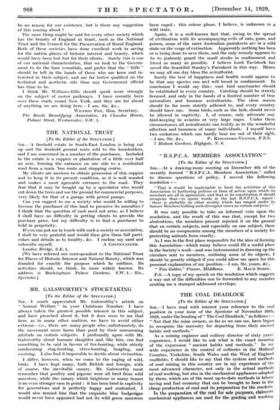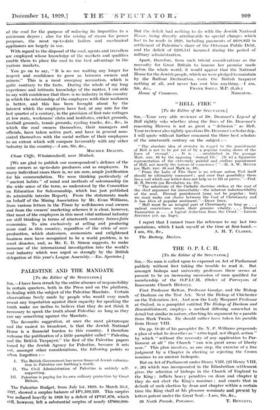THE COAL DEADLOCK [To the Editor of the SPECTATOR.] SIR,—I
have read with interest your reference to the coal position in your issue of the Spectator of November 30th, 1929, under the heading of " The Coal Deadlock," as follows :— " Not that the mine owners, so far as we can see, have begun to recognize the necessity for departing from their ancient
habits and methods."
As a mining engineer and colliery director of sixty years' experience, I would like to ask what is the exact meaning of the expression " ancient habits and methods." In my wide experience in the control of collieries in the Midland Counties, Yorkshire, South Wales and the West of England coalfields, I should like to say that the system and methods of coal mining in this country are in my experience of the most advanced character, not only in the actual methods of coal working, but also in the mechanical appliances adopted by them, which are of the most up-to-date methods in labour saving and fuel economy that can be brought to bear in the cheap production of coal and its preparation for the markets.
In the preparatiOa of the coal for sale purposes, elaborate mechanical appliances are used for the grading and washing
'of the coal for the purpose of reducing its impurities to a minimum degree ; also for the raising of steam for power purposes, the most up-to-date boilers and mechanical appliances are largely in use.
With regard to the disposal of the coal, agents and travellers are eniployed whose knowledge of the markets and qualities enable them to place the coal to the best advantage in the Various markets.
You go on to say, " It is no use waiting any longer for respect and confidence to grow as between owners and miners." This is a most sweeping accusation, which is quite contrary to the facts. During the whole of my long experience and intimate knowledge of the matter, I am able to say with confidence that there is no industry in this country in which the relationship of the employers with their workmen is better, and this has been brought about by the interest which the employers have had, at any rate for the last quarter of a century, in the provision of first-rate cottages at low rents, workmen' clubs and institutes, cricket grounds,
football grounds, tennis grounds, cycling tracks, &c., &c., in which the coal owners themselves, their managers and officials, have taken active part, and have in general asso- ciated themselves with the social welfare of their employees to an extent which will compare favourably with any other industry in the country.—I am, Sir, &c., MAURICE DEACON.
Chase Chile, Whatstandwell, near Matlock.
[We are glad to publish our correspondent's defence of the mine owners as up-to-date producers and as employers. In many individual cases there is, we are sure, ample justification for his commendation. We were thinking particularly of ancient habits " of mind and methods of salesmanship (in the wide sense of the term, as understood by the Committee on Education for Salesmanship, which has just published its admirable interim Report). From the statements made on behalf of the Mining Association by Mr. Evan Williams, from various letters in the Times by well-known coal owners and from the owners' marketing schemes it is clear, however, that most of the employers in this most vital national industry are still thinking in terms of nineteenth century laissez-faire
economics. To aim exclusively at selling and producing more coal in this country, regardless of the crisis of over-
production, which statesmen, economists and enlightened business men have recognized to be a world problem, is to court disaster, and, as Mr. E. D. Simon suggests, to make nonsense of the international investigation into the world's coal industry which was urged so strongly by the British delegation at this year's League Assembly.—En. Spectator.]













































 Previous page
Previous page